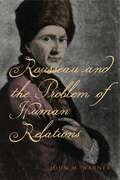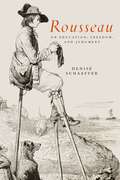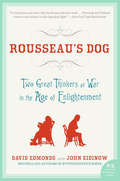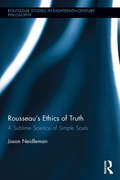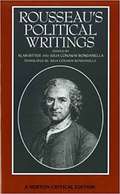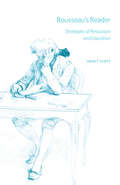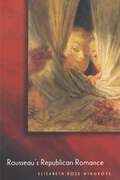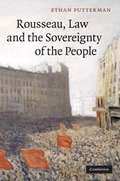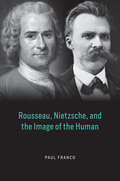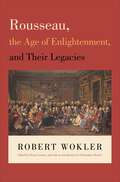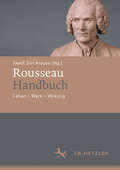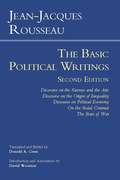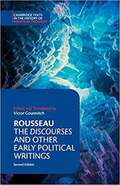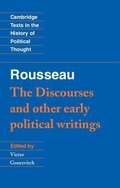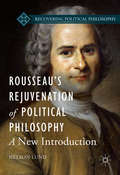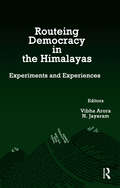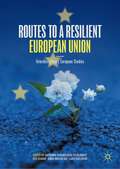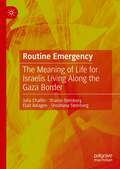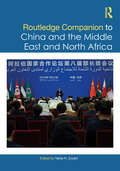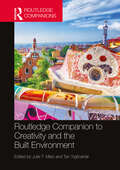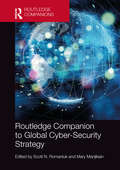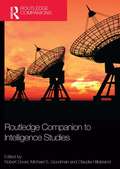- Table View
- List View
Rousseau and the Problem of Human Relations
by John M. WarnerIn this volume, John Warner grapples with one of Jean-Jacques Rousseau’s chief preoccupations: the problem of self-interest implicit in all social relationships. Not only did Rousseau never solve this problem, Warner argues, but he also believed it was fundamentally unsolvable—that social relationships could never restore wholeness to a self-interested human being.This engaging study is founded on two basic but important questions: what do we want out of human relationships, and are we able to achieve what we are after? Warner traces his answers through the contours of Rousseau’s thought on three distinct types of relationships—sexual love, friendship, and civil or political association—as well as alternate interpretations of Rousseau, such as that of the neo-Kantian Rawlsian school. The result is an insightful exploration of the way Rousseau inspires readers to imbue social relations with purpose and meaning, only to show the impossibility of reaching wholeness through such relationships.While Rousseau may raise our hopes only to dash them, Rousseau and the Problem of Human Relations demonstrates that his ambitious failure offers unexpected insight into the human condition and into the limits of Rousseau’s critical act.
Rousseau on Education, Freedom, and Judgment
by Denise SchaefferIn Rousseau on Education, Freedom, and Judgment, Denise Schaeffer challenges the common view of Rousseau as primarily concerned with conditioning citizens’ passions in order to promote republican virtue and unreflective patriotism. Schaeffer argues that, to the contrary, Rousseau’s central concern is the problem of judgment and how to foster it on both the individual and political level in order to create the conditions for genuine self-rule. Offering a detailed commentary on Rousseau’s major work on education, Emile, and a wide-ranging analysis of the relationship between Emile and several of Rousseau’s other works, Schaeffer explores Rousseau’s understanding of what good judgment is, how it is learned, and why it is central to the achievement and preservation of human freedom. The model of Rousseauian citizenship that emerges from Schaeffer’s analysis is more dynamic and self-critical than is often recognized. This book demonstrates the importance of Rousseau’s contribution to our understanding of the faculty of judgment, and, more broadly, invites a critical reevaluation of Rousseau’s understanding of education, citizenship, and both individual and collective freedom.
Rousseau on Education, Freedom, and Judgment
by Denise SchaefferIn Rousseau on Education, Freedom, and Judgment, Denise Schaeffer challenges the common view of Rousseau as primarily concerned with conditioning citizens’ passions in order to promote republican virtue and unreflective patriotism. Schaeffer argues that, to the contrary, Rousseau’s central concern is the problem of judgment and how to foster it on both the individual and political level in order to create the conditions for genuine self-rule. Offering a detailed commentary on Rousseau’s major work on education, Emile, and a wide-ranging analysis of the relationship between Emile and several of Rousseau’s other works, Schaeffer explores Rousseau’s understanding of what good judgment is, how it is learned, and why it is central to the achievement and preservation of human freedom. The model of Rousseauian citizenship that emerges from Schaeffer’s analysis is more dynamic and self-critical than is often recognized. This book demonstrates the importance of Rousseau’s contribution to our understanding of the faculty of judgment, and, more broadly, invites a critical reevaluation of Rousseau’s understanding of education, citizenship, and both individual and collective freedom.
Rousseau's Critique of Inequality
by Frederick NeuhouserRousseau's Discourse on the Origin of Inequality among Mankind, published in 1755, is a vastly influential study of the foundations of human society, including the economic inequalities it tends to create. To date, however, there has been little philosophical analysis of the Discourse in the literature. In this book, Frederick Neuhouser offers a rich and incisive philosophical examination of the work. He clarifies Rousseau's arguments as to why social inequalities are so prevalent in human society and why they pose fundamental dangers to human well-being, including unhappiness, loss of freedom, immorality, conflict, and alienation. He also reconstructs Rousseau's four criteria for assessing when inequalities are or are not legitimate, and why. His reconstruction and evaluation of Rousseau's arguments are accessible to both scholars and students, and will be of interest to a broad range of readers including philosophers, political theorists, cultural historians, sociologists, and economists.
Rousseau's Dog: Two Great Thinkers At War in the Age of Enlightenment
by David Edmonds John EidinowIn 1766 philosopher, novelist, composer, and political provocateur Jean-Jacques Rousseau was a fugitive, decried by his enemies as a dangerous madman. Meanwhile David Hume—now recognized as the foremost philosopher in the English language—was being universally lauded as a paragon of decency. And so Rousseau came to England with his beloved dog, Sultan, and willingly took refuge with his more respected counterpart. But within months, the exile was loudly accusing his benefactor of plotting to dishonor him—which prompted a most uncharacteristically violent response from Hume. And so began a remarkable war of words and actions that ensnared many of the leading figures in British and French society, and became the talk of intellectual Europe. Rousseau's Dog is the fascinating true story of the bitter and very public quarrel that turned the Age of Enlightenment's two most influential thinkers into deadliest of foes—a most human tale of compassion, treachery, anger, and revenge; of celebrity and its price; of shameless spin; of destroyed reputations and shattered friendships.
Rousseau's Ethics of Truth: A Sublime Science of Simple Souls (Routledge Studies in Eighteenth-Century Philosophy)
by Jason NeidlemanIn 1758, Rousseau announced that he had adopted "vitam impendere vero" (dedicate life to truth) as a personal pledge. Despite the dramatic nature of this declaration, no scholar has yet approached Rousseau’s work through the lens of truth or truthseeking. What did it mean for Rousseau to lead a life dedicated to truth? This book presents Rousseau’s normative account of truthseeking, his account of what human beings must do if they hope to discover the truths essential to human happiness. Rousseau’s writings constitute a practical guide to these truths; they describe how he arrived at them and how others might as well. In reading Rousseau through the lens of truth, Neidleman traverses the entirety of Rousseau's corpus, and, in the process, reveals a series of symmetries among the disparate themes treated in those texts. The first section of the book lays out Rousseau’s general philosophy of truth and truthseeking. The second section follows Rousseau down four distinct pathways to truth: reverie, republicanism, religion, and reason. With a strong grounding in both the Anglophone and Francophone scholarship on Rousseau, this book will appeal to scholars across a broad range of disciplines.
Rousseau's Political Writings (Norton Critical Editions)
by Jean-Jacques Rousseau Julia Conaway Bondanella Alan RitterThis Norton Critical Edition includes the three most important of Rousseau’s political writings: Discourse on Inequality, Discourse on Political Economy, and On Social Contract. <P><P> Each piece is fully annotated. Backgrounds includes a sketch of Rousseau’s life, selections from his Confessions, and comments on Rousseau’s work and character from such illustrious contemporaries and early critics as Voltaire, Hume, Boswell and Johnson, Paine, Kant, and Proudhon. Commentaries includes assessments of Rousseau’s political thought by a wide variety of scholars and critics including Judith Shklar, Robert Nisbet, Simone Weil, and Benjamin R. Barber.
Rousseau's Reader: Strategies of Persuasion and Education
by John T. ScottOn his famous walk to Vincennes to visit the imprisoned Diderot, Rousseau had what he called an “illumination”—the realization that man was naturally good but becomes corrupted by the influence of society—a fundamental change in Rousseau’s perspective that would animate all of his subsequent works. At that moment, Rousseau “saw” something he had hitherto not seen, and he made it his mission to help his readers share that vision through an array of rhetorical and literary techniques. In Rousseau’s Reader, John T. Scott looks at the different strategies Rousseau used to engage and persuade the readers of his major philosophical works, including the Social Contract, Discourse on Inequality, and Emile. Considering choice of genre; textual structure; frontispieces and illustrations; shifting authorial and narrative voice; addresses to readers that alternately invite and challenge; apostrophe, metaphor, and other literary devices; and, of course, paradox, Scott explores how the form of Rousseau’s writing relates to the content of his thought and vice versa. Through this skillful interplay of form and content, Rousseau engages in a profoundly transformative dialogue with his readers. While most political philosophers have focused, understandably, on Rousseau’s ideas, Scott shows convincingly that the way he conveyed them is also of vital importance, especially given Rousseau’s enduring interest in education. Giving readers the key to Rousseau’s style, Scott offers fresh and original insights into the relationship between the substance of his thought and his literary and rhetorical techniques, which enhance our understanding of Rousseau’s project and the audiences he intended to reach.
Rousseau's Reader: Strategies of Persuasion and Education
by John T. ScottOn his famous walk to Vincennes to visit the imprisoned Diderot, Rousseau had what he called an “illumination”—the realization that man was naturally good but becomes corrupted by the influence of society—a fundamental change in Rousseau’s perspective that would animate all of his subsequent works. At that moment, Rousseau “saw” something he had hitherto not seen, and he made it his mission to help his readers share that vision through an array of rhetorical and literary techniques. In Rousseau’s Reader, John T. Scott looks at the different strategies Rousseau used to engage and persuade the readers of his major philosophical works, including the Social Contract, Discourse on Inequality, and Emile. Considering choice of genre; textual structure; frontispieces and illustrations; shifting authorial and narrative voice; addresses to readers that alternately invite and challenge; apostrophe, metaphor, and other literary devices; and, of course, paradox, Scott explores how the form of Rousseau’s writing relates to the content of his thought and vice versa. Through this skillful interplay of form and content, Rousseau engages in a profoundly transformative dialogue with his readers. While most political philosophers have focused, understandably, on Rousseau’s ideas, Scott shows convincingly that the way he conveyed them is also of vital importance, especially given Rousseau’s enduring interest in education. Giving readers the key to Rousseau’s style, Scott offers fresh and original insights into the relationship between the substance of his thought and his literary and rhetorical techniques, which enhance our understanding of Rousseau’s project and the audiences he intended to reach.
Rousseau's Republican Romance
by Elizabeth Rose WingroveIn Rousseau's Republican Romance, Elizabeth Wingrove combines political theory and narrative analysis to argue that Rousseau's stories of sex and sexuality offer important insights into the paradoxes of democratic consent. She suggests that despite Rousseau's own protestations, "man" and "citizen" are not rival or contradictory ideals. Instead, they are deeply interdependent. Her provocative reconfiguration of republicanism introduces the concept of consensual nonconsensuality--a condition in which one wills the circumstances of one's own domination. This apparently paradoxical possibility appears at the center of Rousseau's republican polity and his romantic dyad: in both instances, the expression and satisfaction of desire entail a twin experience of domination and submission. Drawing on a wide variety of Rousseau's political and literary writings, Wingrove shows how consensual nonconsensuality organizes his representations of desire and identity. She demonstrates the inseparability of republicanism and accounts of heterosexuality in an analysis that emphasizes the sentimental and somatic aspects of citizenship. In Rousseau's texts, a politics of consent coincides with a performative politics of desire and of emotion. Wingrove concludes that understanding his strategies of democratic governance requires attending to his strategies of symbolization. Further, she suggests that any understanding of political practice requires attending to bodily practices.
Rousseau, Law and the Sovereignty of the People
by Ethan PuttermanTogether with Plato's Republic, Jean-Jacques Rousseau's Social Contract is regarded as one of the most original examples of utopian political engineering in the history of ideas. Similar to the Republic, Rousseau's masterwork is better known today for its author's idiosyncratic view of political justice than its lessons on lawmaking or governance in any concrete sense. Challenging this common view, Rousseau, Law and the Sovereignty of the People examines the Genevan's contributions as a legislator and builder of institutions, relating his major ideas to issues and debates in twenty-first century political science. Ethan Putterman explores how Rousseau's just state would actually operate, investigating how laws would be drafted, ratified and executed, arguing that the theory of the Social Contract is more pragmatic and populist than many scholars assume today.
Rousseau, Nietzsche, and the Image of the Human
by Paul FrancoRousseau and Nietzsche presented two of the most influential critiques of modern life and much can still be learned from their respective analyses of problems we still face. In Rousseau, Nietzsche, and the Image of the Human, Paul Franco examines the relationship between Jean-Jacques Rousseau and Friedrich Nietzsche, arguably the two most influential shapers and explorers of the moral and cultural imagination of late modernity. Both thinkers leveled radical critiques of modern life, but those critiques differed in important respects. Whereas Rousseau focused on the growing inequality of modern society and the hypocrisy, self-division, and loss of civic virtue it spawned, Nietzsche decried the democratic equality he identified with Rousseau and the loss of individual and cultural greatness it entailed. Franco argues, however, that Rousseau and Nietzsche are more than mere critics; they both put forward powerful alternative visions of how we ought to live. Franco focuses specifically on their views of the self and its realization, their understandings of women and the relation between the sexes, and their speculative conceptions of politics. While there are many similarities in their positive visions, Franco argues that it is the differences between them from which we have most to learn.
Rousseau, the Age of Enlightenment, and Their Legacies
by Robert WoklerRobert Wokler was one of the world's leading experts on Rousseau and the Enlightenment, but some of his best work was published in the form of widely scattered and difficult-to-find essays. This book collects for the first time a representative selection of his most important essays on Rousseau and the legacy of Enlightenment political thought. These essays concern many of the great themes of the age, including liberty, equality and the origins of revolution. But they also address a number of less prominent debates, including those over cosmopolitanism, the nature and social role of music and the origins of the human sciences in the Enlightenment controversy over the relationship between humans and the great apes. These essays also explore Rousseau's relationships to Rameau, Pufendorf, Voltaire and Marx; reflect on the work of important earlier scholars of the Enlightenment, including Ernst Cassirer and Isaiah Berlin; and examine the influence of the Enlightenment on the twentieth century. One of the central themes of the book is a defense of the Enlightenment against the common charge that it bears responsibility for the Terror of the French Revolution, the totalitarian regimes of the twentieth-century and the Holocaust.
Rousseau-Handbuch: Leben – Werk – Wirkung
by Skadi Siiri KrauseJean-Jacques Rousseau (1712–1778) ist zweifellos einer der bedeutendsten und vielseitigsten Theoretiker der Aufklärung. Die Wirkung seines politischen, soziologischen, moralphilosophischen, pädagogischen, linguistischen, botanischen und kompositorischen Werks erstreckte sich im 18. Jahrhundert über ganz Europa und Nordamerika. Und diese Rezeption, die längst nicht mehr an bestimmte Länder gebunden ist, hält bis heute an. Dabei zeigt sich, dass Rousseaus Denken noch immer nicht in seiner ganzen Breite erschlossen ist. Gerade in der politischen Theorie ist häufig eine Verengung auf wenige, immer wieder interpretierte Texte und Textpassagen zu beobachten. Dem will das Handbuch entgegenwirken, indem es nicht nur die Fülle von Rousseaus Werk und seine vielfältigen Bezüge vorstellt, sondern auch neuere Forschungstendenzen skizziert, unterschiedliche Deutungsmuster präsentiert und Fragen nach Kohärenz und Widersprüchen, aber auch nach der Aktualität der Schriften des Denkers aufwirft.
Rousseau: Discourse on the Sciences and the Arts, Discourse on the Origin of Inequality, Discourse on Political Economy, On the Social Contract, The State of War (Hackett Classics)
by Jean-Jacques Rousseau Donald A. Cress David WoottonThis substantially revised new edition of Rousseau: The Basic Political Writings features a brilliant new Introduction by David Wootton, a revision by Donald A. Cress of his own 1987 translation of Rousseau's most important political writings, and the addition of Cress' new translation of Rousseau's State of ?War. New footnotes, headnotes, and a chronology by David Wootton provide expert guidance to first-time readers of the texts.
Rousseau: The Discourses And Other Early Political Writings (Cambridge Texts In The History Of Political Thought)
by Jean-Jacques Rousseau Victor GourevitchA comprehensive and authoritative anthology of Rousseau's important early political writings in faithful English translations. This volume includes the Discourse on the Sciences and Arts and the Discourse on the Origin and the Foundations of Inequality among Men - the so-called First and Second Discourses - together with Rousseau's extensive Replies to critics of these Discourses; the Essay on the Origin of Languages; the Letter to Voltaire on Providence; as well as several minor but illuminating writings - the Discourse on Heroic Virtue and the essay Idea of the Method in the Composition of a Book. In these as well as in his later writings, Rousseau probes the very premises of modern thought. His influence was wide-reaching from the very first, and it has continued to grow since his death. The American and the French Revolutions were profoundly affected by his thought, as were Romanticism and Idealism. This new edition features up-to-date translations, an expanded introduction, and an extensive editorial apparatus designed to assist students at every level access these seminal texts.
Rousseau: The Discourses and Other Early Political Writings
by Jean-Jacques Rousseau Victor GourevitchThe work of Jean-Jacques Rousseau is presented in two volumes, together forming a comprehensive anthology of Rousseau's political writings in English. This second volume contains the earlier writings such as the First and Second Discourses, the publication of which signalled the power and challenge of Rousseau's thinking. Rousseau's influence was wide reaching and has continued to grow since his death: major landmarks in world history, such as the American and French Revolutions, were profoundly affected by Rousseau's writing, as were cultural and intellectual movements such as Romanticism and Idealism. This volume, like its successor, contains a comprehensive introduction, chronology and guide to further reading and will enable students to obtain a full understanding of the writings of one of the world's greatest thinkers.
Rousseau’s Rejuvenation of Political Philosophy
by Nelson LundThis book reads Jean-Jacques Rousseau with a view toward deepening our understanding of many political issues alive today, including the place of women in society, the viability of traditional family structures, the role of religion and religious freedom in nations that are becoming ever more secular, and the proper conduct of American constitutional government. Rousseau has been among the most influential modern philosophers, and among the most misunderstood. The first great philosophic critic of the Enlightenment, he sought to revive political philosophy as it was practiced by Plato, and to make it useful in the modern world. His understanding of politics rests on deep and often prescient reflections about the nature of the human soul and the relationship between our animal origins and the achievements of civilization. This book demonstrates that the implications Rousseau drew from those reflections continue to deserve serious attention.
Routeing Democracy in the Himalayas: Experiments and Experiences
by Vibha Arora; N. JayaramHistorically treated as an amorphous borderland and marginal to the understanding of democratic politics and governance in South Asia, Southeast Asia and northern Asia, the Himalayan region, in the last 50 years, has become an ‘active political laboratory’ for experiments in democratic structures and institutions. In turn, it has witnessed the evolution of myriad political ideologies, movements and administrative strategies to accommodate and pacify heterogeneous ethnic-national identities.Routeing Democracy in the Himalayas highlights how, through an ongoing process of democratisation, the Western liberal ideologies of democracy and decentralisation have interacted with varied indigenous politico-cultural ideas and institutions of an ethnic-nationally diverse population. It also reviews how formal democracy, regular elections, local self-governing structures, protection of the rights of minorities and indigenes, freedom of expression, development of mass media and formation of ethnic homelands — all have furthered participatory democracy, empowered the traditionally marginalised groups and ensured sustainable development to varying degrees. The book provides ethnographic and historical vistas of democracy under formation, at work, being contested and even being undermined, showing how democratisation thematically stitches the independent Himalayan nations and the Indian Himalayan states into a distinctive regional political mosaic.Combining new perspectives from comparative sociology, political anthropology and development studies, the volume will be useful for policy makers, as well as specialists, researchers and students in sociology, anthropology, area studies, development studies, and Tibet and Himalayan studies.
Routes to a Resilient European Union: Interdisciplinary European Studies
by Lars Oxelheim Anna Michalski Antonina Bakardjieva Engelbrekt Per EkmanThe fifth volume of the Interdisciplinary European Studies series aims to explore the EU’s pursuit of societal resilience and its role in the transition to a green economy. It brings together scholars from economics, law, and political science to provide insights related to climate change and the protection of the environment, the role of innovation in the green economy, resilience of national public health systems after the COVID-19 pandemic, regulatory resilience in the face of financial instability, and immigration. All chapters are based on up-to-date research, succinct assessment of the current state of affairs, and ongoing debates. They conclude with policy recommendations for decision-makers on European and national levels.
Routine Emergency: The Meaning of Life for Israelis Living Along the Gaza Border
by Julia Chaitin Sharon Steinberg Elad Avlagon Shoshana SteinbergThis book explores the meaning of life for Israelis from communities bordering the Gaza Strip, whose lives are bound to the intractable conflict between Israel and the Hamas regime. Based on a psychosocial qualitative study of narrative interviews, photographs, YouTube videos, and Facebook posts created by residents, the book presents the life stories of ordinary people, their perspectives of patriotism and Zionism, and their perceptions of the Gazan Palestinians. Routine Emergency captures these perspectives through analyses of residents’ interviews and photographs, the social media materials and poems fashioned from interviewees’ words. The results challenge simplistic notions of what it means to live in this warzone, offering a multi-layered analysis of life in this region, which alternates between being Heaven and Hell. Written in a reader-friendly format, Routine Emergency, offers new theoretical insights into societal beliefs connected to living in an intractable warzone on the personal, family, community and national levels.
Routledge Companion to China and the Middle East and North Africa
by Yahia H ZoubirFocusing on China’s relations with the Middle East and North Africa (MENA), this Companion provides essential analysis of a complex region which threatens to become the battleground for rival powers in the future. The Routledge Companion to China and the Middle East and North Africa brings together China scholars from around the world, including from China, the MENA region, the United States, Asia, and Europe. The contributors, experts in their respective areas––which range from politics, military and nuclear power to economics, energy, and tourism––use different methodologies to understand China’s policies in the MENA. Topics analyzed include Chinese investment in infrastructure, the COVID-19 pandemic and the Belt and Road Initiative. Divided into three Parts, the book addresses China’s multidimensional presence in the MENA and its impact on the region while also explicating the MENA’s relations with its traditional Western allies. Bilateral relations and people-to-people interactions are also explored and provide in-depth context to the areas of cooperation that are part of China’s dealings with its partners in the region. Combining contemporary analysis with accessible prose, the book will be of interest to students, scholars, and policy-makers active in international relations, security studies, and economics, as well to general audiences interested in the MENA region.
Routledge Companion to Creativity and the Built Environment (Routledge International Handbooks)
by Tan Yigitcanlar Julie T. MiaoThis book crtitically examines the reciprocal relationship between creativity and the built environment and features leading voices from across the world in a debate on originating, learning, modifying, and plagiarizing creativities within the built environment.The Companion includes contributions from architecture, design, planning, construction, real estate, economics, urban studies, geography, sociology, and public policies. Contributors review the current field and proposes new conceptual frameworks, research methodologies, and directions for research, policy, and practice. Chapters are organised into five sections, each drawing on cross-disciplinary insights and debates: Section I connects creativity, productivity, and economic growth and examines how our built environment stimulates or intimidates human imaginations. Section II addresses how hard environments are fabricated with social, cultural, and institutional meanings, and how these evolve in different times and settings. Section III discusses activities that directly and indirectly shape the material development of a built environment, its environmental sustainability, space utility, and place identity. Section IV illustrates how technologies and innovations are used in building and strengthening an intelligent, real-time, responsive urban agenda. Section V examines governance opportunities and challenges at the interface between creativity and built environment. An important resource for scholars and students in the fields of urban planning and development, urban studies, environmental sustainability, human geography, sociology, and public policy.
Routledge Companion to Global Cyber-Security Strategy
by Mary Manjikian Scott N. RomaniukThis companion provides the most comprehensive and up-to-date comparative overview of the cyber-security strategies and doctrines of the major states and actors in Europe, North America, South America, Africa, and Asia. The volume offers an introduction to each nation’s cyber-security strategy and policy, along with a list of resources in English that may be consulted for those wishing to go into greater depth. Each chapter is written by a leading academic or policy specialist, and contains the following sections: overview of national cyber-security strategy; concepts and definitions; exploration of cyber-security issues as they relate to international law and governance; critical examinations of cyber partners at home and abroad; legislative developments and processes; dimensions of cybercrime and cyberterrorism; implications of cyber-security policies and strategies. This book will be of much interest to students and practitioners in the fields of cyber-security, national security, strategic studies, foreign policy, and international relations.
Routledge Companion to Intelligence Studies
by Robert Dover Michael S. Goodman Claudia HillebrandThe Routledge Companion to Intelligence Studies provides a broad overview of the growing field of intelligence studies. The recent growth of interest in intelligence and security studies has led to an increased demand for popular depictions of intelligence and reference works to explain the architecture and underpinnings of intelligence activity. Divided into five comprehensive sections, this Companion provides a strong survey of the cutting-edge research in the field of intelligence studies: Part I: The evolution of intelligence studies; Part II: Abstract approaches to intelligence; Part III: Historical approaches to intelligence; Part IV: Systems of intelligence; Part V: Contemporary challenges. With a broad focus on the origins, practices and nature of intelligence, the book not only addresses classical issues, but also examines topics of recent interest in security studies. The overarching aim is to reveal the rich tapestry of intelligence studies in both a sophisticated and accessible way. This Companion will be essential reading for students of intelligence studies and strategic studies, and highly recommended for students of defence studies, foreign policy, Cold War studies, diplomacy and international relations in general.
